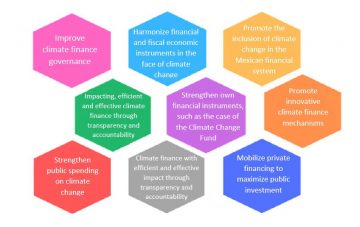In order to contribute to the process of reaching the necessary investment to meet the adaptation and mitigation goals established in the Nationally Determined Contributions (NDCs), the document sets out the national strategy for mobilizating climate change funding, consisting of a series of objectives and their respective lines of action.
Climate finance is a fundamental execution mechanism for both the short- and medium-term management of climate change, and for the transition to a low carbon and climate resilient development. The adequate mobilization and channeling of financial resources for mitigation and adaptation actions is essential for contributing to the advancement on fulfilling the goals set in the Mexican NDCs before the Paris Agreement. Although Mexico has a broad legal and institutional framework on climate change, there is still a wide range of action to strengthen the planning and regulatory framework that provides certainty and viability to the mobilization of financial resources to meet Mexico’s climate change goals.
A climate financing strategy requires a series of policy instruments. On one hand, it requires clear information and diagnoses on the climate change financing sources in the country, and on the other hand, having planning instruments that integrate actions to which resources are directed (mitigation, adaptation or others), as well as identifying the main economic sectors and beneficiaries. Similarly, it is necessary to characterize the demand for climate financing by sector, and finally to know the challenges, needs and problems for the execution of adequate and efficient financing.
Regarding the demand for financing, the INECC estimated that the economic cost added to comply with the NDCs for the period 2015-2030 in Mexico amounts to $126 billion dollars. On the side of financing sources, the study of Climate Finance Group for Latin America and the Caribbean GFLAC, concluded that considering the financing for climate change actions channeled through public international sources, the national public sector, green bonds and private banking in the country, a financing mobilization of $ 7.703 billion dollars was estimated during the 2014- 2018 period, which would represent approximately 6% of the $126 billion goal that would cost the implementation of Mexico’s NDCs in mitigation.
Under this context, the Mexican-German Climate Change Alliance of the German Cooperation for Sustainable Development (GIZ) supported the General Directorate of Climate Change Policies (DGPCC) of the Ministry of Environment and Natural Resources (SEMARNAT) to develop lines of action that were integrated in the review and update of the National Climate Change Strategy, whether through national or international, public or private sources to be able to guide and coordinate all the actors involved and thus address the challenges and guide the financing of projects to combat climate change, and be able to meet the goals of NDCs.
Once the multisectoral and multi-actor dialogues stage is completed to identify gaps and areas of opportunity for climate finaning; GFLAC and the Mexican-German Climate Change Alliance built the Climate Financing Mobilization Strategy (CFMS) for Mexico as an action plan to mobilize resources in a sustainable way with the purpose of: i) strengthening, increasing and mobilizing the financing for climate change that will allow meeting the goals that Mexico has established at national and international level ii) incorporating climate change management in public and private decisions to achieve a low carbon and climate resilient development.
The vision of the strategy is based on the following sectors and areas of action: energy transition, rural development, sustainable cities and ecosystem management and conservation. In turn, its focus is directed to certain areas of transversal action such as governance, principles, planning, training, information, instruments and knowledge market on climate finance. In that sense, the CFMS is based on the following objectives:
CFMS goals for Mexico

To achieve these objectives, lines of action focused on addressing the needs and challenges of financing were established, as well as the actors and institutions responsible for contributing, regulating and coordinating actions related to the financing of actions for climate change mitigation and adaptation.
According to the previous diagnosis, these needs and challenges are mainly related to:
- Improve planning instruments and the existing regulatory framework around climate finance
- Lack of a taxonomy and a mechanism for measuring, reporting and verifying climate finance
- Insufficient coordination of efforts between the different government orders, and agreement between the public, private and social sectors
- Limited information on financial mechanisms, how they are designated and applied to certain projects
- Need to increase and improve the planning and allocation of the public budget on climate change
- Ignorance and lack of diagnosis on the operation and structuring of projects to access financing with the Climate Change Fund
- Lack of both articulation from various sources, and promotion of the efficient use of international financing flows
- Limited link between economic, financial and fiscal instruments for climate change
- Lack of dissemination in the use of innovative climate finance mechanisms
- Lack of promotion and facilitation in the incorporation of climate change criteria in the financial sector guidelines
In summary, this strategy seeks to generate the guidelines to guide the mobilization of financial flows aimed at mitigating and adapting climate change necessary to meet the goals established in the NDCs, orienting the channeling of resources in strategic sectors, and linking the national climate change policy and other national programs and strategies related to the transition to low carbon and climate resilient development in the country.
